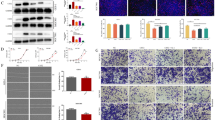Abstract
Background
Colorectal cancer (CRC) is the third leading cause of death from cancer worldwide. Immature colon carcinoma transcript-1 (ICT1) has been reported to be correlated with lung cancer; however, whether ICT1 is a functional gene in CRC, as well as the molecular mechanism underlying ICT1 mediation of colorectal-tumor formation, remains unknown.
Methods
The expression of ICT1 was firstly determined by using immunohistochemistry in 861 CRC specimens. The correlation of ICT1 expression with clinicopathological parameters and the survival rate was analyzed. Furthermore, we investigated the effect of ICT1 silencing on CRC cell proliferation and migration by MTT, colony formation, flow cytometry, and transwell in vitro.
Results
ICT1 is highly expressed in a cohort of human CRCs, and that higher ICT1 expression may lead to reduced overall survival rate of CRC. Likewise, ICT1 silencing lowered the cell viability through cell-cycle arrest, inhibited cell migration, and induced apoptosis in CRC. We further revealed a novel mechanism in which ICT1 promoted CRC growth via the intracellular AMPK, SAPK/JNK, and PARP signaling pathways.
Conclusions
Our data showed that ICT1 could be an important target for CRC diagnosis and treatment.



Similar content being viewed by others
References
van Belzen N, Dinjens WN, Eussen BH, Bosman FT. Expression of differentiation-related genes in colorectal cancer: possible implications for prognosis. Histol Histopathol. 1998;13(4):1233–42.
Kumar A, Agarwal S, Heyman JA, et al. Subcellular localization of the yeast proteome. Genes Dev. 15 2002;16(6):707–19.
Pagliarini DJ, Calvo SE, Chang B, et al. A mitochondrial protein compendium elucidates complex I disease biology. Cell. 2008;134(1):112–23.
Rorbach J, Richter R, Wessels HJ, et al. The human mitochondrial ribosome recycling factor is essential for cell viability. Nucleic Acids Res. 2008;36(18):5787–99.
Richter R, Rorbach J, Pajak A, et al. A functional peptidyl-tRNA hydrolase, ICT1, has been recruited into the human mitochondrial ribosome. EMBO J. 2010;29(6):1116–25.
Greber BJ, Boehringer D, Leitner A, et al. Architecture of the large subunit of the mammalian mitochondrial ribosome. Nature. 2014;505(7484):515–9.
Handa Y, Hikawa Y, Tochio N, et al. Solution structure of the catalytic domain of the mitochondrial protein ICT1 that is essential for cell vitality. J Mol Biol. 2010;404(2):260–73.
Huang P, Cao K, Zhao H. Screening of critical genes in lung adenocarcinoma via network analysis of gene expression profile. Pathol Oncol Res. 2014;20(4):853–8.
Wesolowska MT, Richter-Dennerlein R, Lightowlers RN, Chrzanowska-Lightowlers ZM. Overcoming stalled translation in human mitochondria. Front Microbiol. 2014;5:374.
Xie R, Zhang Y, Shen C, Cao X, Gu S, Che X. Knockdown of immature colon carcinoma transcript-1 inhibits proliferation of glioblastoma multiforme cells through Gap 2/mitotic phase arrest. Onco Targets Therapy. 2015;8:1119–27.
Cerezo-Guisado MI, Zur R, Lorenzo MJ, et al. Implication of Akt, ERK1/2 and alternative p38MAPK signalling pathways in human colon cancer cell apoptosis induced by green tea EGCG. Food Chem Toxicol. 2015;84:125–32.
Wang Z, Xu D, Gao Y, et al. Immature colon carcinoma transcript 1 is essential for prostate cancer cell viability and proliferation. Cancer Biother Radiopharm. 2015;30(7):278–84.
Aslan Kosar P, Tuncer H, Cihangir Uguz A, et al. The efficiency of Poly(ADP-ribose) polymerase (PARP) cleavage on detection of apoptosis in an experimental model of testicular torsion. Int J Exp Pathol. 2015;96(5):294–300
Borghetti G, Yamaguchi AA, Aikawa J, Yamazaki RK, de Brito GA, Fernandes LC. Fish oil administration mediates apoptosis of Walker 256 tumor cells by modulation of p53, Bcl-2, caspase-7 and caspase-3 protein expression. Lipids Health Dis. 2015;14:94.
Saiprasad G, Chitra P, Manikandan R, Sudhandiran G. Hesperidin induces apoptosis and triggers autophagic markers through inhibition of Aurora-A mediated phosphoinositide-3-kinase/Akt/mammalian target of rapamycin and glycogen synthase kinase-3 beta signalling cascades in experimental colon carcinogenesis. Eur J Cancer. 2014;50(14):2489–507.
Acknowledgment
This study was supported by grants from the National Natural Science Foundation of China (No. 81472228).
Conflict of interest
Xinyuan Lao, Qingyang Feng, Guodong He, Meiling Ji, Dexiang Zhu, Pingping Xu, Wentao Tang, Jianmin Xu, and Xinyu Qin declare no conflict of interest.
Author information
Authors and Affiliations
Corresponding authors
Additional information
Xinyuan Lao, PhD, Qingyang Feng, MD, and Guodong He, MD, PhD have contributed equally to this study.
Electronic supplementary material
Below is the link to the electronic supplementary material.
10434_2016_5305_MOESM2_ESM.tif
Representative ICT1 depletion images of colony formation in SW1116 and HCT116 cells Supplementary material 2 (TIFF 14331 kb)
10434_2016_5305_MOESM4_ESM.tif
Representative ICT1 depletion images of Annexin V/7ADD staining results in SW1116 and HCT116 cells Supplementary material 4 (TIFF 8810 kb)
10434_2016_5305_MOESM6_ESM.tif
ICT1 depletion does not affect cell growth and migration in normal cells. (a, b) Knockdown efficiency of ICT1 was analyzed by quantitative real-time PCR and western blot. (c) MTT assay showed that cell numbers were no difference between ICT1 depletion groups (ICT1-S1 and ICT1-S2 groups) and control group (NC group). (d) The proportion of apoptosis cell was revealed. (e) Statistical analysis of the number of migrated cells in different groups. ** p < 0.01, compared with NC group. Supplementary material 6 (TIFF 7419 kb)
Rights and permissions
About this article
Cite this article
Lao, X., Feng, Q., He, G. et al. Immature Colon Carcinoma Transcript-1 (ICT1) Expression Correlates with Unfavorable Prognosis and Survival in Patients with Colorectal Cancer. Ann Surg Oncol 23, 3924–3933 (2016). https://doi.org/10.1245/s10434-016-5305-1
Received:
Published:
Issue Date:
DOI: https://doi.org/10.1245/s10434-016-5305-1




